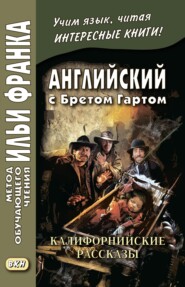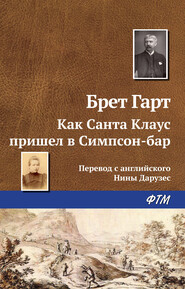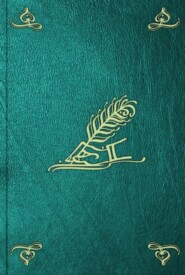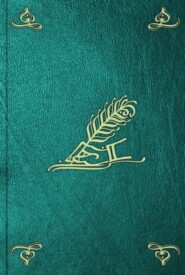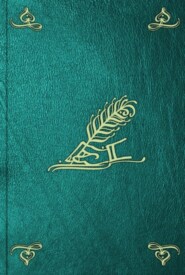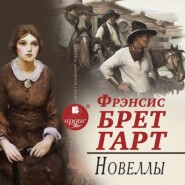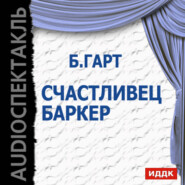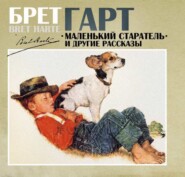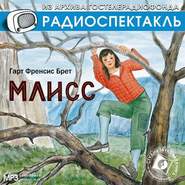По всем вопросам обращайтесь на: info@litportal.ru
(©) 2003-2024.
✖
Gabriel Conroy
Автор
Год написания книги
2017
Настройки чтения
Размер шрифта
Высота строк
Поля
In spite of the mixed character of Mr. Hamlin's metaphor, his eloquence was so convincing and effective that Miss Sophy at once proceeded with considerable indignation to insist upon Olly's withdrawing her refusal.
"If this is the way you are going to act, you horrid little thing! after all that me and him's trusted you, I'd like to see the girl in school that will ever tell you anything again, that's all!" a threat so appalling that Olly, who did not stop to consider that this confidence was very recent and had been forced upon her, assented without further delay, exhibited Gabriel's letter to Madame Eclair, and having received that lady's gracious permission to visit her brother, was in half an hour in company with Mr. Hamlin on the road.
CHAPTER V.
THE THREE VOICES
Once free from the trammelling fascinations of Sophy and the more dangerous espionage of Madame Eclair, and with the object of his mission accomplished, Mr. Hamlin recovered his natural spirits, and became so hilarious that Olly, who attributed this exaltation to his interview with Sophy, felt constrained to make some disparaging remarks about that young lady, partly by way of getting even with her for her recent interference, and partly in obedience to some well known but unexplained law of the sex. To her great surprise, however, Mr. Hamlin's spirits were in no way damped, nor did he make any attempt to defend his Lalage. Nevertheless, he listened attentively, and when she had concluded he looked suddenly down upon her chip hat and thick yellow tresses, and said —
"Ever been in the Southern country, Olly?"
"No," returned the child.
"Never down about San Antonio, visiting friends or relations?"
"No," said Olly, decidedly.
Mr. Hamlin was silent for some time, giving his exclusive attention to his horse, who was evincing a disposition to "break" into a gallop. When he had brought the animal back into a trot again he continued —
"There's a woman! Olly."
"Down in San Antonio?" asked Olly.
Mr. Hamlin nodded.
"Purty?" continued the child.
"It ain't the word," responded Mr. Hamlin, seriously. "Purty ain't the word."
"As purty as Sophy?" continued Olly, a little mischievously.
"Sophy be hanged!" Mr. Hamlin here quickly pulled up himself and horse, both being inclined to an exuberance startling to the youth and sex of the third party. "That is – I mean something in a different suit entirely."
Here he again hesitated, doubtful of his slang.
"I see," quoth Olly; "diamonds – Sophy's in spades."
The gambler (in sudden and awful admiration), "Diamonds – you've just struck it! but what do you know 'bout cards?"
Olly, pomposaménte, "Everything! Tell our fortunes by 'em – we girls! I'm in hearts – Sophy's in spades – you're in clubs! Do you know," in a thrilling whisper, "only last night I had a letter, a journey, a death, and a gentleman in clubs, dark complected – that's you."
Mr. Hamlin – a good deal more at ease through this revelation of the universal power of the four suits – "Speakin' of women, I suppose down there (indicating the school) you occasionally hear of angels. What's their general complexion?"
Olly, dubiously, "In the pictures?"
Hamlin, "Yes;" with a leading question, "sorter dark complected sometimes, hey?"
Olly, positively, "Never! always white."
Jack, "Always white?"
Olly, "Yes, and flabby!"
They rode along for some time silently. Presently Mr. Hamlin broke into a song, a popular song, one verse of which Olly supplied with such deftness of execution and melodiousness of pipe that Mr. Hamlin instantly suggested a duet, and so over the dead and barren wastes of the Sacramento plains they fell to singing, often barbarously, sometimes melodiously, but never self-consciously, wherein, I take it, they approximated to the birds and better class of poets, so that rough teamsters, rude packers, and weary wayfarers were often touched, as with the birds and poets aforesaid, to admiration and tenderness; and when they stopped for supper at a wayside station, and Jack Hamlin displayed that readiness of resource, audacity of manner and address, and perfect and natural obliviousness to the criticism of propriety or the limitations of precedent, and when, moreover, the results of all this was a much better supper than perhaps a more reputable companion could have procured, she thought she had never known a more engaging person than this Knave of Clubs.
When they were fairly on the road again, Olly began to exhibit some curiosity regarding her brother, and asked some few questions about Gabriel's family, which disclosed the fact that Jack's acquaintance with Gabriel was comparatively recent.
"Then you never saw July at all?" asked Olly.
"July," queried Jack, reflectively; "what's she like?"
"I don't know whether she's a heart or a spade," said Olly, as thoughtfully.
Jack was silent for some moments, and then after a pause, to Olly's intense astonishment, proceeded to sketch, in a few vigorous phrases, the external characteristics of Mrs. Conroy.
"Why, you said you never saw her!" ejaculated Olly.
"No more I did," responded the gambler, with a quick laugh; "this is only a little bluff."
It had grown cold with the brief twilight and the coming on of night. For some time the black, unchanging outlines of the distant Coast Range were sharply silhouetted against a pale, ashen sky, that at last faded utterly, leaving a few stars behind as emblems of the burnt-out sunset. The red road presently lost its calm and even outline in the swiftly gathering shadows, or to Olly's fancy was stopped by shapeless masses of rock or giant-like trunks of trees that in turn seemed to give way before the skilful hand and persistent will of her driver. At times a chill exhalation from a roadside ditch came to Olly like the damp breath of an open grave, and the child shivered even beneath the thick travelling shawl of Mr. Hamlin, with which she was enwrapped. Whereat Jack at once produced a flask and prevailed upon Olly to drink something that set her coughing, but which that astute and experienced child at once recognised as whisky. Mr. Hamlin, to her surprise, however, did not himself partake, a fact which she at once pointed out to him.
"At an early age, Olly," said Mr. Hamlin, with infinite gravity, "I promised an infirm and aged relative never to indulge in spirituous liquors, except on a physician's prescription. I carry this flask subject to the doctor's orders. Never having ordered me to drink any, I don't."
As it was too dark for the child to observe Mr. Hamlin's eyes, which, after the fashion of her sex, she consulted much oftener than his speech for his real meaning, and was as often deceived, she said nothing, and Mr. Hamlin relapsed into silence. At the end of five minutes he said —
"She was a woman, Olly – you bet!"
Olly, with great tact and discernment, instantly referring back to Mr. Hamlin's discourse of an hour before, queried, "That girl in the Southern country?"
"Yes," said Mr. Hamlin.
"Tell me all about her," said Olly – "all you know."
"That ain't much," mused Hamlin, with a slight sigh. "Ah, Olly, she could sing!"
"With the piano?" said Olly, a little superciliously.
"With the organ," said Hamlin.
Olly, whose sole idea of this instrument was of the itinerant barrel variety, yawned slightly, and with a very perceptible lack of interest said that she hoped she would see her some time when she came up that way and was "going 'round."
Mr. Hamlin did not laugh, but after a few minutes' rapid driving, began to explain to Olly with great earnestness the character of a church organ.
"I used to play once, Olly, in a church. They did say that I used sometimes to fetch that congregation, jest snatch 'em bald-headed, Olly, but it's a long time ago! There was one hymn in particular that I used to run on consid'rable – one o' them Masses o' Mozart – one that I heard her sing, Olly; it went something like this;" and Jack proceeded to lift his voice in the praise of Our Lady of Sorrows, with a serene unconsciousness to his surroundings, and utter absorption in his theme that would have become the most enthusiastic acolyte. The springs creaked, the wheels rattled, the mare broke, plunged, and recovered herself, the slight vehicle swayed from side to side, Olly's hat bruised and flattened itself against his shoulder, and still Mr. Hamlin sang. When he had finished he looked down at Olly. She was asleep!
Jack was an artist and an enthusiast, but not unreasonable nor unforgiving. "It's the whisky," he murmured to himself, in an apologetic recitation to the air he had just been singing. He changed the reins to his other hand with infinite caution and gentleness, slowly passed his disengaged arm round the swaying little figure, until he had drawn the chip hat and the golden tresses down upon his breast and shoulder. In this attitude, scarcely moving a muscle lest he should waken the sleeping child, at midnight he came upon the twinkling lights of Fiddletown. Here he procured a fresh horse, dispensing with an ostler and harnessing the animal himself, with such noiseless skill and quickness that Olly, propped up in the buggy with pillows and blankets borrowed from the Fiddletown hostelry, slept through it all, nor wakened even after they were again upon the road, and had begun the long ascent of the Wingdam turnpike.
It wanted but an hour of daybreak when he reached the summit, and even then he only slackened his pace when his wheels sank to their hubs in the beaten dust of the stage road. The darkness of that early hour was intensified by the gloom of the heavy pine woods through which the red road threaded its difficult and devious way. It was very still. Hamlin could hardly hear the dead, muffled plunge of his own horse in the dusty track before him, and yet once or twice he stopped to listen. His quick ear detected the sound of voices and the jingle of Mexican spurs, apparently approaching behind him. Mr. Hamlin knew that he had not passed any horseman and was for a moment puzzled. But then he recalled the fact that a few hundred yards beyond, the road was intersected by the "cut-off" to One Horse Gulch, which, after running parallel with the Wingdam turnpike for half a mile, crossed it in the forest. The voices were on that road going the same way. Mr. Hamlin pushed on his horse to the crossing, and hidden by the darkness and the trunks of the giant pines, pulled up to let the strangers precede him. In a few moments the voices were abreast of him and stationary. The horsemen had apparently halted.







